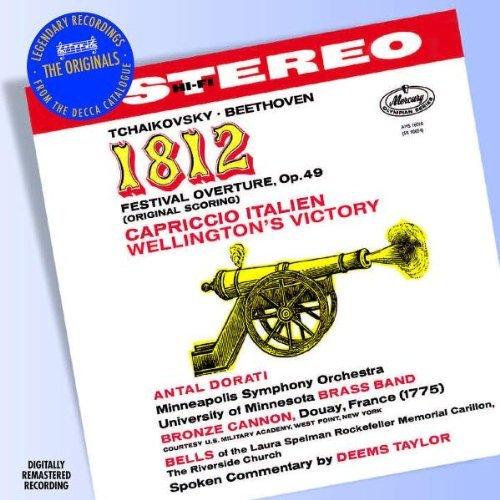Beethoven/Tchaikovsky Orchestral Works
View record and artist detailsRecord and Artist Details
Composer or Director: Ludwig van Beethoven, Pyotr Ilyich Tchaikovsky
Genre:
Orchestral
Label: Living Presence
Magazine Review Date: 12/1995
Media Format: CD or Download
Media Runtime: 66
Mastering:
Stereo
ADD
Catalogue Number: 434 360-2MM

Tracks:
| Composition | Artist Credit |
|---|---|
| 1812 |
Pyotr Ilyich Tchaikovsky, Composer
Antál Dorati, Conductor Minneapolis Symphony Orchestra Pyotr Ilyich Tchaikovsky, Composer |
| Capriccio Italien |
Pyotr Ilyich Tchaikovsky, Composer
Antál Dorati, Conductor Minneapolis Symphony Orchestra Pyotr Ilyich Tchaikovsky, Composer |
| Wellingtons Sieg, '(Die) Schlacht bei Vittoria' |
Ludwig van Beethoven, Composer
Antál Dorati, Conductor London Symphony Orchestra Ludwig van Beethoven, Composer |
Author:
Although not normally given to fits of nostalgia, I have to confess that this CD found me beaming back to my teenage years, poised between the two modest speakers of a Bush record player and eager for an aural bombardment. Both battle pieces incorporate cannon fire recorded at West Point, with Wellington's Victory adding antiphonal muskets and 1812, the University of Minnesota Brass Band and the bells of the Laura Spelman Rockefeller carillon. In a recorded commentary on the 1812 sessions, Deems Taylor explains how, prior to 'battle', roads were blocked and an ambulance crew put on standby. The actual weapons used were chosen both for their historical authenticity (period instruments of destruction) and their sonic impact, the latter proving formidable even today. In fact, the crackle and thunder of Wellington's Victory could easily carry a DDD endorsement; perhaps we should, for the occasion, invent a legend of Daring, Deafening and potentially Deadly.
Dorati's conducting is brisk, incisive and appropriately dramatic. 1812 in particular (Dorati's second Minneapolis recording of the piece for Mercury) suggests a rare spontaneity, with a fiery account of the main 'conflict' and a tub-thumping peroration where bells, band, guns and orchestra conspire to produce one of the most riotous key-clashes in gramophone history. Capriccio italien was recorded some three years earlier (1955, would you believe) and sounds virtually as impressive. Again, the approach is crisp and balletic, whereas the 1960 LSO Beethoven recording (originally coupled with excellent versions of the overtures Prometheus and Leonore No. 3) triumphs by dint of its energy and orchestral discipline.
As 'fun' CDs go, this must surely be one of the best – provided you can divorce Mercury's aural militia from the terrifying spectre of real conflict (such as we see almost daily via the media). Wilma Cozart Fine has masterminded an astonishingly effective refurbishment while the documentation – both written and recorded – is extremely comprehensive.
'
Dorati's conducting is brisk, incisive and appropriately dramatic. 1812 in particular (Dorati's second Minneapolis recording of the piece for Mercury) suggests a rare spontaneity, with a fiery account of the main 'conflict' and a tub-thumping peroration where bells, band, guns and orchestra conspire to produce one of the most riotous key-clashes in gramophone history. Capriccio italien was recorded some three years earlier (1955, would you believe) and sounds virtually as impressive. Again, the approach is crisp and balletic, whereas the 1960 LSO Beethoven recording (originally coupled with excellent versions of the overtures Prometheus and Leonore No. 3) triumphs by dint of its energy and orchestral discipline.
As 'fun' CDs go, this must surely be one of the best – provided you can divorce Mercury's aural militia from the terrifying spectre of real conflict (such as we see almost daily via the media). Wilma Cozart Fine has masterminded an astonishingly effective refurbishment while the documentation – both written and recorded – is extremely comprehensive.
'
Explore the world’s largest classical music catalogue on Apple Music Classical.
Included with an Apple Music subscription. Download now.

Gramophone Digital Club
- Digital Edition
- Digital Archive
- Reviews Database
- Events & Offers
From £9.20 / month
Subscribe
Gramophone Club
- Print Edition
- Digital Edition
- Digital Archive
- Reviews Database
- Events & Offers
From £11.45 / month
Subscribe
If you are a library, university or other organisation that would be interested in an institutional subscription to Gramophone please click here for further information.






